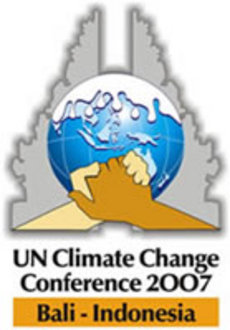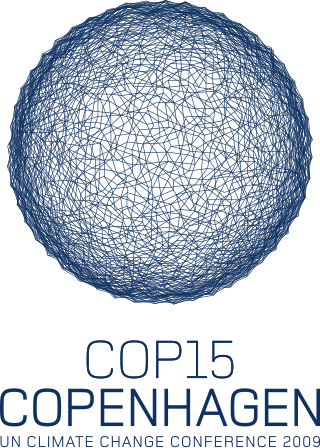
The Kyoto Protocol (Japanese: 京都議定書, Hepburn: Kyōto Giteisho) was an international treaty which extended the 1992 United Nations Framework Convention on Climate Change (UNFCCC) that commits state parties to reduce greenhouse gas emissions, based on the scientific consensus that global warming is occurring and that human-made CO2 emissions are driving it. The Kyoto Protocol was adopted in Kyoto, Japan, on 11 December 1997 and entered into force on 16 February 2005. There were 192 parties (Canada withdrew from the protocol, effective December 2012) to the Protocol in 2020.
The United Nations Framework Convention on Climate Change (UNFCCC) established an international environmental treaty to combat "dangerous human interference with the climate system", in part by stabilizing greenhouse gas concentrations in the atmosphere. It was signed by 154 states at the United Nations Conference on Environment and Development (UNCED), informally known as the Earth Summit, held in Rio de Janeiro from 3 to 14 June 1992. Its original secretariat was in Geneva but relocated to Bonn in 1996. It entered into force on 21 March 1994.
Post-Kyoto negotiations refers to high level talks attempting to address global warming by limiting greenhouse gas emissions. Generally part of the United Nations Framework Convention on Climate Change (UNFCCC), these talks concern the period after the first "commitment period" of the Kyoto Protocol, which expired at the end of 2012. Negotiations have been mandated by the adoption of the Bali Road Map and Decision 1/CP.13.

The 2007 United Nations Climate Change Conference took place at the Bali International Conference Centre, Nusa Dua, Bali, Indonesia, between December 3 and December 15, 2007. Representatives from over 180 countries attended, together with observers from intergovernmental and nongovernmental organizations. The conference encompassed meetings of several bodies, including the 13th Conference of the Parties to the United Nations Framework Convention on Climate Change, the 3rd Meeting of the Parties to the Kyoto Protocol, together with other subsidiary bodies and a meeting of ministers.

Yvo de Boer is an advisor and consultant on international environmental policy. De Boer is the former Executive Secretary of the United Nations Framework Convention on Climate Change (UNFCCC), a position he held from 2006 until 2010. After his UN tenure, de Boer was Global Chairman of Climate Change and Sustainability Services at KPMG. From 2014 to 2016 de Boer was Director-General of the Global Green Growth Institute (GGGI), a Seoul-based international environmental organization.

Global Day of Action is a direct action protest format. Environmentalism initiatives began to use it in 2005 in connection with Global Climate Campaign. They aimed to focus world attention on the anthropogenic effect that humans are having on global warming. Its main objective is to spearhead demands that elected representatives of their respective governments honor commitments set forth by the Kyoto Protocol, by conducting in unison peaceful demonstrations around the world. The demonstration, or rallies, are intended to coincide with the United Nations Framework Convention on Climate Change (UNFCCC), a meeting of world leaders from 189 nations, that meet annually to discuss climate change.
After the 2007 United Nations Climate Change Conference held on the island of Bali in Indonesia in December 2007, the participating nations adopted the Bali Road Map as a two-year process working towards finalizing a binding agreement at the 2009 United Nations Climate Change Conference in Copenhagen, Denmark. The conference encompassed meetings of several bodies, including the 13th session of the Conference of the Parties to the United Nations Framework Convention on Climate Change and the third session of the Conference of the Parties serving as the meeting of the Parties to the Kyoto Protocol.

The 2009 United Nations Climate Change Conference, commonly known as the Copenhagen Summit, was held at the Bella Center in Copenhagen, Denmark, between 7 and 18 December. The conference included the 15th session of the Conference of the Parties to the United Nations Framework Convention on Climate Change (UNFCCC) and the 5th session of the Conference of the Parties serving as the Meeting of the Parties to the Kyoto Protocol. According to the Bali Road Map, a framework for climate change mitigation beyond 2012 was to be agreed there.

Kevin Mark Conrad, born in the United States to parents living in Papua New Guinea in 1968, is a Papua New Guinean businessman and environmentalist. He grew up in the Arapesh tribe near Wewak, East Sepik Province and graduated from Ukarumpa High School in the Eastern Highlands Province.

The 2008 United Nations Climate Change Conference took place at PIF Congress Centre, Poznań International Fair (PIF), in Poznań, Poland, between December 1 and December 12, 2008. Representatives from over 180 countries attended along with observers from intergovernmental and nongovernmental organizations.
Sustainia, formerly the Copenhagen Climate Council, is a global collaboration between international business and science founded by Erik Rasmussen founder of the leading independent think tank in Scandinavia, Monday Morning, based in Copenhagen. The councilors of the Copenhagen Climate Council have come together to create global awareness of the importance of the UN Climate Summit (COP15) in Copenhagen, December 2009, and to ensure technical and public support and assistance to global decision makers when agreeing on a new climate treaty to replace the Kyoto Protocol from 1997.

Karen Christiana Figueres Olsen is a Costa Rican diplomat who has led national, international and multilateral policy negotiations. She was appointed Executive Secretary of the UN Framework Convention on Climate Change (UNFCCC) in July 2010, six months after the failed COP15 in Copenhagen. During the next six years she worked to rebuild the global climate change negotiating process, leading to the 2015 Paris Agreement, widely recognized as a historic achievement.

The International Day of Forests was established on the 21st day of March, by resolution of the United Nations General Assembly on November 28, 2013. Each year, various events celebrate and raise awareness of the importance of all types of forests, and trees outside forests, for the benefit of current and future generations. Countries are encouraged to undertake efforts to organize local, national, and international activities involving forests and trees, such as tree planting campaigns, on International Day of Forests. The Secretariat of the United Nations Forum on Forests, in collaboration with the Food and Agriculture Organization, facilitates the implementation of such events in collaboration with governments, the Collaborative Partnership on Forests, and international, regional and subregional organizations. International Day of Forests was observed for the first time on March 21, 2013.

The United Nations Climate Change Conferences are yearly conferences held in the framework of the United Nations Framework Convention on Climate Change (UNFCCC). They serve as the formal meeting of the UNFCCC parties – the Conference of the Parties (COP) – to assess progress in dealing with climate change, and beginning in the mid-1990s, to negotiate the Kyoto Protocol to establish legally binding obligations for developed countries to reduce their greenhouse gas emissions. Starting in 2005 the conferences have also served as the "Conference of the Parties Serving as the Meeting of Parties to the Kyoto Protocol" (CMP); also parties to the convention that are not parties to the protocol can participate in protocol-related meetings as observers. From 2011 to 2015 the meetings were used to negotiate the Paris Agreement as part of the Durban platform, which created a general path towards climate action. Any final text of a COP must be agreed by consensus.

The 2015 United Nations Climate Change Conference, COP 21 or CMP 11 was held in Paris, France, from 30 November to 12 December 2015. It was the 21st yearly session of the Conference of the Parties (COP) to the 1992 United Nations Framework Convention on Climate Change (UNFCCC) and the 11th session of the Meeting of the Parties (CMP) to the 1997 Kyoto Protocol.

The 2016 United Nations Climate Change Conference was an international meeting of political leaders and activists to discuss environmental issues. It was held in Marrakech, Morocco, on 7–18 November 2016. The conference incorporated the twenty-second Conference of the Parties (COP22), the twelfth meeting of the parties to the Kyoto Protocol (CMP12), and the first meeting of the parties to the Paris Agreement (CMA1). The purpose of the conference was to discuss and implement plans about combatting climate change and to "[demonstrate] to the world that the implementation of the Paris Agreement is underway". Participants work together to come up with global solutions to climate change.
The 2018 United Nations Climate Change Conference, more commonly referred to as the Katowice Climate Change Conference or COP24, was the 24th Conference of the Parties to the United Nations Framework Convention on Climate Change. It was held between 2 and 15 December 2018 in Katowice, Poland. The conference was held in the International Congress Centre. The president of COP24 was Michał Kurtyka. The conference also incorporated the fourteenth meeting of the parties for the Kyoto Protocol (CMP14), and the third session of the first meeting of the parties for the Paris Agreement which agreed on rules to implement the Agreement. The conference's objective was to have a full implementation of the Paris agreement.

The 2019 United Nations Climate Change Conference, also known as COP25, was the 25th United Nations Climate Change conference. It was held in Madrid, Spain, from 2 to 13 December 2019 under the presidency of the Chilean government. The conference incorporated the 25th Conference of the Parties to the United Nations Framework Convention on Climate Change (UNFCCC), the 15th meeting of the parties to the Kyoto Protocol (CMP15), and the second meeting of the parties to the Paris Agreement (CMA2).
The history of climate change policy and politics refers to the continuing history of political actions, policies, trends, controversies and activist efforts as they pertain to the issue of climate change. Climate change emerged as a political issue in the 1970s, where activist and formal efforts were taken to ensure environmental crises were addressed on a global scale. International policy regarding climate change has focused on cooperation and the establishment of international guidelines to address global warming. The United Nations Framework Convention on Climate Change (UNFCCC) is a largely accepted international agreement that has continuously developed to meet new challenges. Domestic policy on climate change has focused on both establishing internal measures to reduce greenhouse gas emissions and incorporating international guidelines into domestic law.













